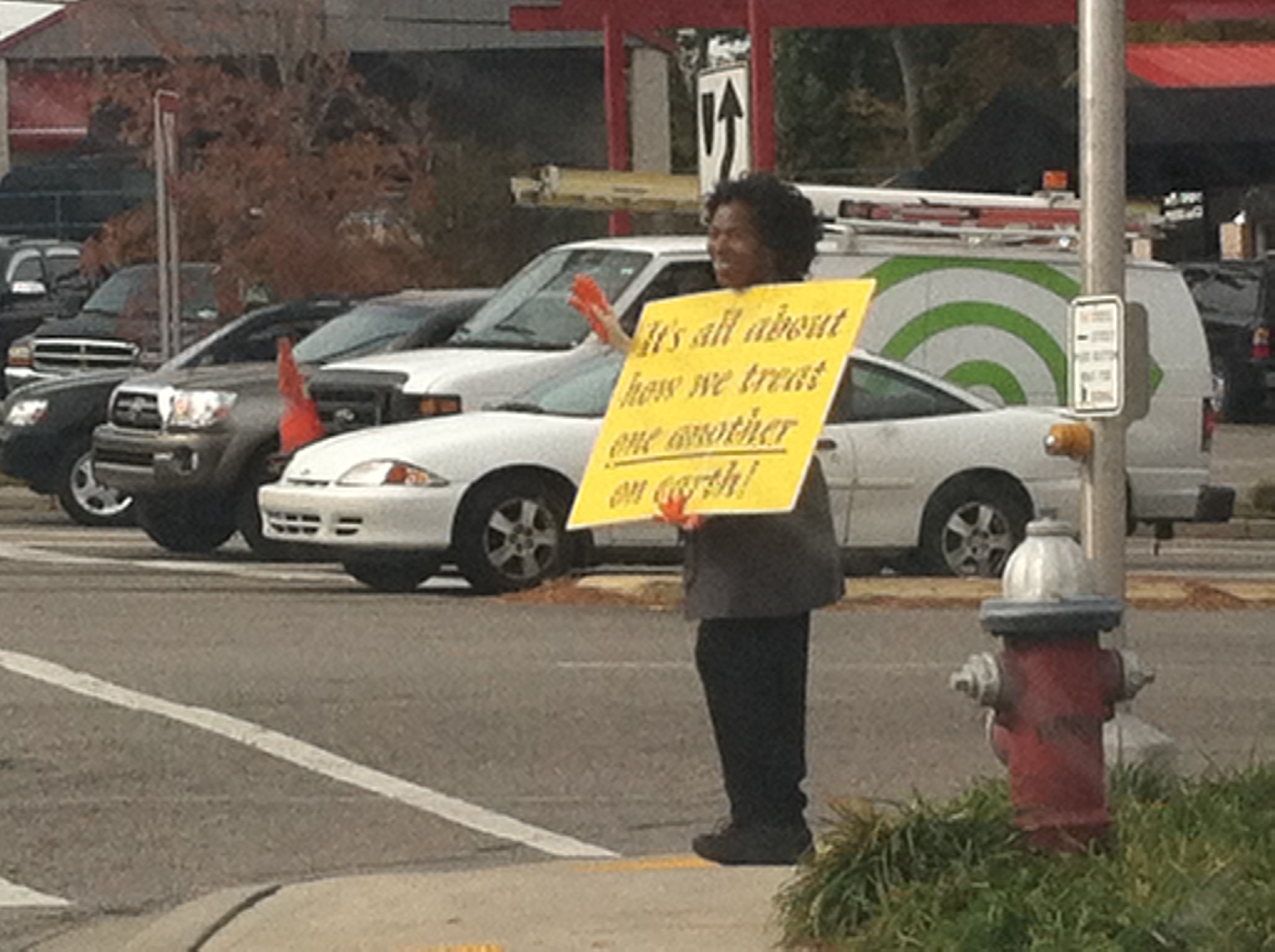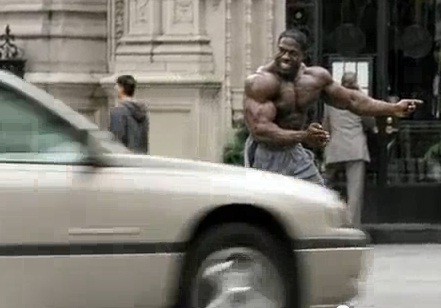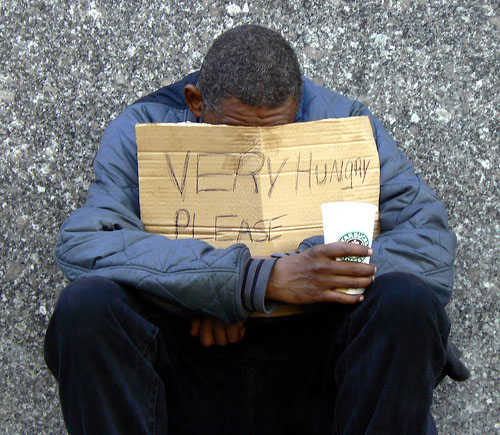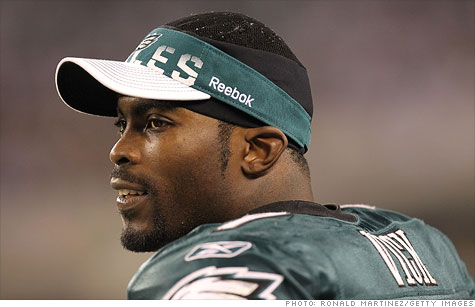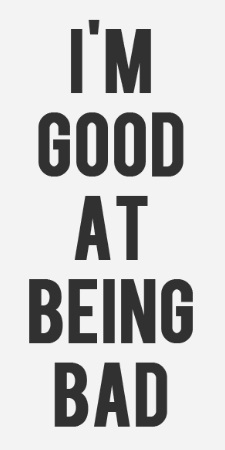 Believe it or not, I have a few enemies walking around on this planet. If they were to ever see this post title, they would whole-heartedly agree that I am a bad person. A few of them have even taken the time to let me know how bad they think I am. Just for the record, they are right. I am a bad person but for different reasons than they think.
Believe it or not, I have a few enemies walking around on this planet. If they were to ever see this post title, they would whole-heartedly agree that I am a bad person. A few of them have even taken the time to let me know how bad they think I am. Just for the record, they are right. I am a bad person but for different reasons than they think.
For my enemies, I am a bad person because I have done some bad things. Like everyone else with a pulse, I have not always made the wisest decisions. At times I have acted selfishly and hurt others as a result, even unintentionally. Even though I am truly sorry for those actions and have done what I can to make peace with those I have wronged, their pain remains. Some have chosen to forgive me. Some have not. No one forgets. Be that as it may, I can’t change the past and it’s not healthy for me to stay there. So, I now embrace my past and try to learn from my scars.
I am not a bad person because I have done some bad things. If that was the criteria for being a bad person, than everyone would share this same title. Haven’t we all done something bad at some point in our lives? The problem lies in our definition of bad. For many out there, they view “badness” in terms of action alone and have created an unspoken hierarchy and ambiguous rating system. For example, murderers are obviously bad. So are adulterers and rapists. If you steal something, you’re also bad. Or if you harm children or any animals. Also, if you get drunk, do drugs, chew (or go out with those who do), you’re also bad. While we are at it, if you have tattoos (especially visible ones) or have any type of piercing (other than your ears) – you’re probably bad. After all, “good” people in the church choir don’t have these. As you can see from my sarcasm, it’s a slippery slope when bad is relegated to actions alone.
There are also varying degrees of bad, at least that’s how we act. For some reason, robbing someone’s home is worse than stealing someone’s car. But if you kidnap a child you are worse than the hijacker of cars. These examples of stealing are worse than if you stole money from your neighbor’s purse which is worse than stealing paper from your employer’s copy machine. And stealing “time” from that same employer does not count because it is not a tangible item that is missing, even if your employer’s “bottom line” says differently. It can get confusing and crazy trying to not only keep track of what you do but comparing yourself to others. Even if, by your own definition, you are bad – at least you’re not as bad as the guy next to you. After all, he has a tattoo.
During this particular holiday season, there is a lot of discussion about Santa’s “list” and who has been “naughty” or “nice.”  This list is based entirely on behavior from the previous months. We all have (in our mind) what constitutes as “naughty” and who is deserving of Santa’s coal. But what if bad went beyond action? What if you received that title simply because of your thoughts? Thoughts precede action and therefore before anyone is bad in deed, they are bad in thought.
This list is based entirely on behavior from the previous months. We all have (in our mind) what constitutes as “naughty” and who is deserving of Santa’s coal. But what if bad went beyond action? What if you received that title simply because of your thoughts? Thoughts precede action and therefore before anyone is bad in deed, they are bad in thought.
How many of us have lustful thoughts during the day? How many have wished ill on their enemy or even their ex? How many desire revenge on the highway? How many have thought about taking what is not yours simply because “no one will know?” How many have thought poorly about someone at work? The truth is, if you add thoughts to the criteria of bad, the list of bad people just grew exponentially. You may not have killed someone but you have certainly wanted to. You may not have physically cheated on someone’s spouse but you have thought about what it would be like. Have we all not looked at someone’s house (car, clothes, life, paycheck, etc) at some point and secretly desired it? Who among us has not looked down on someone simply because they are less fortunate than us? Add thoughts to the equation and very very few of us can escape the label of “bad”.
Being a bad person goes even deeper than just our actions and thoughts. Remember, we are human BEINGS. So, what is our being? It’s not as pretty as you might think. For example, observe a two-year old. No one seems more innocent than a baby or child. But are they? Watch them interact with other children or even their parents. No decent parent teaches them how to lie, deceive or steal. Yet, these same little “angels” will behave like master thieves, on their own, with no previous examples, coaching or experience. How? How does such a young child, devoid of evil training, learn how to act so sneaky? Where do they learn how to tell a lie? They watch Barney and Sesame Street and stay with Mom constantly and suddenly, at the playground, they are mini-Hitler. How can you explain this? You certainly didn’t teach them to steal toys and hit others. Why do they behave in this way? Two words:
Human nature.
Nurture is how you were raised. Nature is how you were born. Nurture is influenced by environment. Nature is determined by genetics. Your nurture (upbringing) may have been good, even really good. Your nature is not. You are, quite literally, bad to the bone. Genetically speaking, you’re a sinful mess. Your DNA is rotten, at the core. When Adam fell in the Garden, a sinful nature entered his heart that has been passed down from generation to generation ever since. This does not mean you are evil, it just means you are capable of it. This is what the Apostle Paul was talking about when he wrote, “Therefore, just as through one man sin entered into the world, and death through sin, and so death spread to all men, because all sinned.” (Romans 5:12) We aren’t bad because we do bad things. We do bad things because we are bad – at the heart level. Just as an apple tree produces an apple, sinful hearts produce sinful actions.
Our justice system makes the assumption that we are, “innocent until proven guilty.” We make the assumption that we are “basically good.” God has a different opinion. He doesn’t compare us to each other. He compares us to Him and doesn’t judge with a bell curve. King David recognized our predicament when he wrote, “I was brought forth in iniquity, and in sin my mother conceived me.” (Psalm 51:5) The prophet Jeremiah understood our heart condition when he penned, “The heart is more deceitful than all else and is desperately sick; who can understand it?” (Jeremiah 17:9) The Apostle Paul ended the debate as to who was more advantaged in God’s sight when he writes, “Are we (Jews) better than they? (non-Jews)? Not at all: for we have already charged that both Jews and Greeks are under sin; as it is written, “There is none righteous, not even one… for all have sinned and fall short of the glory of God.” Even as a highly educated spiritual leader of his day, Paul was acutely aware of his fallen nature. He writes, “For I know that nothing good dwells in me, that is, in my flesh; for the willing is present in me, but the doing of the good is not. For the good that I want, I do not do, but I practice the very evil that I do not want. But if I am doing the very thing I do not want, I am no longer the one doing it, but sin which dwells in me. I find then the principle that evil is present in me, the one who wants to do good.” (Romans 7:18-21) The man who wrote 13 books of the New Testament even referred to himself as the “chief of sinners.” (I Timothy 1:15) It doesn’t matter if you were raised by Christian parents, attended Christian school, baptized in a Christian church by a Christian pastor and can recite the Christian’s Bible in the original languages. Every heart begins beating hostile to God and is inclined to give Him the middle finger. And because of that, heart surgery is required.
This is why good works cannot get you into Heaven, as many seem to believe. Logically, it doesn’t make sense. How good do you have to be for a perfect God to let you in? What deeds does He count as good? What about your bad deeds? Do they cancel out the good ones? How do you know the current score? What if you have good deeds but bad thoughts? Can bad thoughts cancel out good deeds? What good are good deeds if you still have a bad heart? The questions are endless and exhausting. In our performance based culture, we want to work our way in. Doing or thinking or being “good” isn’t the prerequisite for Heaven. If it were, how did the thief on the cross get in?
33 years after Jesus entered the world as a baby, He hung from a cross between two thieves. The two criminals represented all of mankind; Jew or Gentile, black or white, male or female, slave or free, me or you. Both were bad men, committing crimes that were fully deserving of their death penalty. Both had spent their lives taking from others. Now they were going to have their lives taken from them. They were hanging, helpless and hopeless. In-between them hang Christ; silent and bleeding. Though He was dying, He was still at work. He had one more heart to change, a heart probably harder than yours. The thief was on death row with no more cards to play. He can no longer run and his lies don’t work here. It’s really hard to lie when you are staring at the Truth. He offers no apologies and he makes no promises. He just utters a humble prayer, “Remember me when You come in Your kingdom.” No good deeds are possible. All his thoughts are regret. All he has left is his bad self and humble request. Apparently that’s all he needed. “Today“, Jesus said, “you will be with Me in Paradise.” The irony is striking. Jesus was welcomed to earth in a stable. A sinful crook is welcomed to Heaven with a mansion. That’s how God treats people who recognize their sin and their inability to fix it.
I think that is what I like most about this season called Christmas. It’s not the gifts though they are nice to give and receive. It’s not the Christmas trees or the lights. It’s not the carols and egg nog and mistletoe. It’s the reminder. A reminder of what is the true reason for the season. Jesus didn’t come to give us a gift. Instead, He came to be one. The Baby in the manger didn’t come to be cute, but to be the Cure. He didn’t come to make good men nicer. He came to make bad men His. He didn’t come to warm my heart. He came to give me a new one. And He’s still working. He’s got more hearts to change, one bad thief at a time.
And there is no greater Christmas present than a new heart.
********************************************************
“If any man thinks ill of you, do not be angry with him, for you are worse than he thinks you to be. If he charges you falsely on some point, yet be satisfied, for if he knew you better he might change the accusation, and you would be no gainer by the correction. If you have your moral portrait painted and it is ugly, be satisfied, for it only needs a few blacker touches, and it would be still nearer the truth.” – Charles Haddon Spurgeon
“For by grace you have been saved through faith; and that not of yourselves, it is the gift of God; not as a result of works, so that no one may boast.” (Ephesians 2:8-9, emphasis mine).
“But when the kindness and love of God our Savior appeared, he saved us, not because of righteous things we had done, but because of his mercy.” (Titus 3:4-5)







